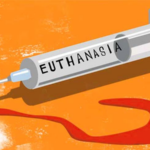Blog Post
Five Canadian veterans were proactively offered assisted suicide
Christopher Lyon, a Canadian man, has written a powerful essay on witnessing his father’s assisted suicide over the objections of his family, who desperately tried to inform the MAiD assessors of their father’s mental health condition. When he reached the (unnamed, but I believe I know who it is) medical professional who would kill his father, he got the brushoff:
When, at last, I heard from Provider before his death, I asked if she had received our list of concerns and received an evasive response. The provider seemed to want to hurry off the phone and appeared to be in a busy place, like a hospital corridor, as I could hear voices in the background. I therefore only had a few seconds to describe my father’s complex history. Provider also appeared to regard my father’s suicidal history and previous depression diagnosis as news. During that call, I also relayed, as had my other family members, that I had spoken to a MAiD psychiatrist who had advised me to push hard for a psychiatric assessment. Upon learning this, Provider reluctantly agreed to try to get a last-minute psychiatric evaluation but was unsure if a psychiatrist could be found so close to scheduled death.
A psychiatrist was found. Provider bluntly told me before my father’s evaluation that the psychiatrist would “just agree” and “provide cover” for her, yet also said he would be ineligible for MAiD if mental illness was found. However, “finding” mental illness would only be a comorbidity and not a sole diagnosis, given the approval and track move rationales, so this comment does not make sense to me. Despite my advisement that Dad had previously been diagnosed, the provider said she did not think he was depressed. I was very disturbed by Provider’s presumption of the outcome of the psychiatric assessment, which suggested to me the evaluation would lack independence and rigour.
The whole essay is very much worth reading just for the insights into the process. Lyon closes with a chilling description of his father’s death:
Provider was meant to arrive between three-thirty and four, but turned-up late, at about five past four, and voiced, callous and cheery, “I hear it’s someone’s birthday!” before proceeding to ‘obtain final consent’ for the suicide-homicide. My father declared his consent with a belligerent “Get me the hell out of here!” and Provider became Death.
Death tried one arm and then the other for an injection site, settling on his right side, and sat body-warm beside me on the small, smooth, clinical sofa. Death then delivered her long poison-parade of prepared syringes, fished out in order from a plastic toolbox – the chemicals, like the box, repurposed for something their makers did not intend. Adrift somewhere on the slow white river of propofol, flowing into him from three or four milk-bottle syringes, Dad disappeared. His warm face blanched and his head lolled where he was left propped upon the bed. It took him twenty minutes to die.
Death’s last words to me, just as she left a short time later, were a demand not to bring the concerns or issues I had raised “forward”.
He was 77.
To the physicians-turned-killers, this man was a patient requesting a lethal injection—not a man with a complicated past, a loving family, and more life to live. He was demanding access to a right, and that was the only thing that mattered. And because suicide is now a right, it is being pro-actively offered. Remember that international scandal when it turned out that a Canadian veteran had been offered death instead of treatment for PTSD? It turns out he wasn’t the only one—and that Canadian veterans were offered assisted suicide in five separate instances. And yet—not a single comment from the prime minister, who cannot contain himself when a black man is murdered in Minneapolis.









will the Vet Affairs people / doctor be offered a Trudeau style bonus IF they kill a veteran??